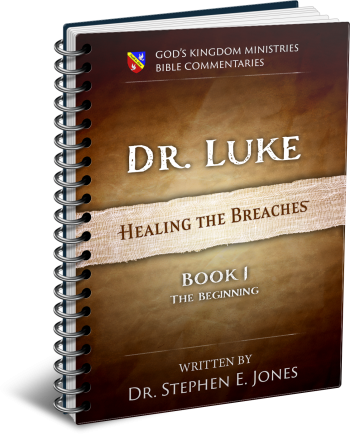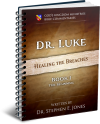Latest Posts
View the latest posts in an easy-to-read list format, with filtering options.

This book covers Luke 1-3, expounding on the circumstances of John's birth and then Jesus' birth and early life. It ends with John's ministry and introduces Jesus as the Ambassador of Heaven, giving His genealogical credentials.
Category - Bible Commentaries

The angel Gabriel came to Mary in the first chapter of Luke to tell her that she had been chosen to bring forth the promised Messiah. Luke 1:27 tells us that she was a “virgin” (parthenos) of the house of David.
Luke used the Greek term parthenos in reference to Isaiah 7:14, which prophesies,
14 Therefore the Lord Himself will give you a sign; behold, a virgin [almah] will be with child and bear a son, and she will call His name Immanuel.
The Hebrew text reads almah for “virgin,” but the Septuagint translation uses the Greek word parthenos. So Luke uses the same Greek equivalent. While it may be argued that parthenos may mean either a virgin or simply a young maiden, we need not belabor the precise meaning of the Greek term. More important is how the Greek language was being used to express Hebrew thought.
Hence, almah is the word we must understand. This word appears seven times in the Hebrew Scriptures. Its root is elem, “young man,” made feminine by the last letter (?). The emphasis appears to be upon youth, rather than virginity itself, but nonetheless, the word is usually understood to mean a virgin. Certainly, this is how it is used in Gen. 24:43 when Eleazar was sent to find a wife for Isaac. He prays,
43 Behold, I am standing by the spring, and may it be that the maiden [almah] who comes out to draw and to whom I say, “Please let me drink a little water from your jar”; 44 and she will say to me, “You drink, and I will draw for your camels also”; let her be the woman whom the Lord has appointed for my master’s son.
Certainly, Eleazar was searching not only for a young woman but for a virgin. Likewise, Mary, being engaged to Joseph, was yet a virgin, for there is no indication that she had been married previously or had lost her virginity in any other way. Those who attempt to argue about the various shades of meaning of these Hebrew and Greek words should simply look at the way in which Luke uses the term. He applies it to Mary, who was indeed a virgin.
Luke was careful also to specify that Mary was of the house of David, because it was well known to all that the Messiah was to come from his lineage. Christ had to be born of the tribe of Judah and specifically from David to fulfill the prophecies of His first appearance. The scepter had been given first to Judah in Gen. 49:10, and later this was narrowed down to David himself (Psalm 89:29).
In the broader picture, Christ was called the “son of David,” not only to show that relationship, but also to prophesy of the conflict over the throne between David and Absalom. Absalom too was a “son of David,” and he overthrew David for a time, claiming the throne for himself (2 Sam. 15:10).
This was done with the help of David’s friend and counselor, Ahithophel (2 Sam. 15:12, 31), who betrayed him by helping Absalom. Later, Ahithophel regretted his actions and hanged himself (2 Sam. 17:23).
So Jesus came to fulfill the story of David. His throne was usurped by the chief priests representing Absalom. The usurpers were assisted by Judas, Jesus “friend” (Matt. 26:50), who later hanged himself (Matt. 27:5).
It was therefore important that Mary should be descended from King David. Jesus, in His first coming, had to experience the same sorrow which His ancestor David had experienced, in order to be the “man of sorrows and acquainted with grief” (Isaiah 53:3).
David himself returned to the throne after some time had passed, and Absalom was killed (2 Sam. 18:15). So also the Levitical priests who usurped Christ’s throne will not rule with Christ when He returns to claim His throne. That honor has already passed to the Melchizedek Order, of which Jesus Christ is the High Priest, even though He did not come through the tribe of Levi.
It is also important to understand that Joseph could not have been the father of Jesus. The lineage of Joseph, the husband of Mary, is given in the genealogy given by Matthew. In Matt. 1:11 we read,
11 And to Josiah were born Jeconiah and his brothers, at the time of the deportation to Babylon.
Of Jeconiah (or Coniah), Jer. 22:30 says,
30 Thus says the Lord, “Write this man down childless, a man who will not prosper in his days; for no man of his descendants will prosper sitting on the throne of David or ruling again in Judah.”
Hence, if Jesus had been born of Joseph, He would have been disqualified to take the throne of David. Mary was not a descendant of Jeconiah, but came from David through Nathan, son of David (Luke 3:31). Jeconiah was descended from Solomon, Nathan’s brother. Thus, not only the demands of prophecy were fulfilled, but also the prophetic restrictions were honored in the birth of Jesus.
We will discuss this in greater detail when we study Luke’s genealogy in Luke 3.
The prophecies given to Judah and David demanded that Mary would be born of their lineage. Even so, she was a virgin when the Holy Spirit conceived Christ in her. Hence, a greater prophecy had to be fulfilled, wherein Christ had a heavenly Father and an earthly mother.
This is also the basis of our own claim as the “sons of God.” The Holy Spirit has come upon believers to beget “Christ in you, the hope of glory” (Col. 1:27). The seed of the Father impregnates us spiritually by the gospel (1 Cor. 4:15, KJV), which is the “good news” that Gabriel gave to Mary.
That holy seed is in those who believe, as 1 John 5:1 says,
1 Whoever believes that Jesus is the Christ is begotten [gennao] of God; and whoever loves the Father loves the child begotten [gennao] of Him.
When the Greek word gennao is used of a woman, it means “to give birth.” But when it is used of a man (or in this case God as a Father), it means “to beget.” Hence, John was speaking of the holy seed that is in us, the embryo of Christ that has been begotten by the Father to replace the offspring of the first Adam which has been sentenced to death.
This holy seed cannot sin, because it is begotten of God, as we read in 1 John 5:4, “For whatever is begotten of God overcomes the world.” Again, he writes in 1 John 3:9 (literal rendering),
9 All who are begotten of God do not commit sin; for His seed abides in him; and he cannot sin, because he is begotten of God.
Christ in us has been begotten by our heavenly Father. It is the “new man” within us, which cannot and does not sin. If believers sin, it is the old man that is sinning—not the new man—for Paul says in Rom. 7:17, “So now, no longer am I the one doing it [evil], but sin which indwells me.”
Our flesh (that is, the old Adamic man) will never attain Sonship. Only the new man in us, begotten of God, can be a “son of God,” for its Father is God Himself. In this way we can become the sons of God in the same pattern set forth in the virgin birth of Christ in Mary. We are all Marys. In our flesh we are all the earthly mother of Christ in us. But we are sons of God on account of our heavenly Father.